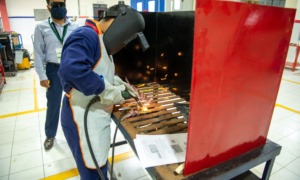
 The school-to-prison pipeline refers to the streamlining of at-risk students from schools to incarceration or related correctional-type facilities that results from punitive discipline practices and criminalizing misconduct in schools. Ultimately, the school-to-prison pipeline is the consequence of zero tolerance policies that originally mandated schools to penalize students for bringing weapons and drugs onto school grounds.
The school-to-prison pipeline refers to the streamlining of at-risk students from schools to incarceration or related correctional-type facilities that results from punitive discipline practices and criminalizing misconduct in schools. Ultimately, the school-to-prison pipeline is the consequence of zero tolerance policies that originally mandated schools to penalize students for bringing weapons and drugs onto school grounds.
This penalty has grown to include nonviolent offenses that do not pose an immediate threat or harm. An alarming rate of students have been suspended and/or expelled for noncriminal acts such as disruptive behavior, violation of dress code, displays of affection or defiant behavior toward authority. In the 2011-12 academic year, 260,000 students were referred to law enforcement and 130,000 were expelled due to minor infractions. During that same time, more than 3 million students were suspended at least once. It has been discovered that a student is 23.5 percent more likely to drop out of school after receiving exclusionary discipline.
With individual schools having discretion to apply zero tolerance, a recognizable pattern has developed of minority students being disciplined more harshly, and at disproportionate rates, for minor subjective behaviors that do not cause physical or mental harm, such as verbal aggression, being disrespectful toward authorities or cellphone usage. Students of color have been found to be lower academic achievers, overall, and are detrimentally impacted by the low expectations set forth by school systems.
According to the Civil Rights Data Collection (CRDC), African-American students represent 16 percent of the national student population, but 34 percent were expelled and 42 percent were suspended multiple times in 2014. Similar statistics are reflected for Hispanic and other racial minority youth nationwide.
Lesbian, gay, bisexual and transgender (LGBT) youth and students with disabilities are also found to be negatively impacted by this pipeline. LGBT youth are often victimized by their peers and blamed as the cause of problems by their teachers, and students with disabilities are often misdiagnosed and more likely to be held back a grade, which often leads to dropout. With such staggering statistics found in the available research, it is imperative that newer approaches to school discipline be considered and implemented to decrease the negative impacts such policies have on students and to decrease the streamlining of students into incarceration.
Alternative discipline strategies
While strict disciplinary actions such as expulsion are vital for punishing behavior that threatens the safety of others in school settings, it is not effective in correcting more minor problematic behaviors. Schools should instead use more positive-based strategies for addressing and modifying defiant behaviors.
Protecting the most vulnerable students from the dangers of incarceration and recidivism must be of primary concern. The school environment should be one of the main settings to help these students work on eliminating such undesirable behaviors, particularly for those who lack effective discipline at home.
Methods such as the On-Campus Intervention Program (OCIP) and Consistency Management and Cooperative Discipline (CMCD) program are alternative approaches to suspension and expulsion that have the ability to create a shift from a punitive learning environment to one that is warm and welcoming for all students.
OCIP provides counseling and support services to help students address and modify challenging behaviors by giving them opportunities to learn from their mistakes and focus on personal development. This program also emphasizes the development of essential life skills such as effective communication, goal setting, decision making and issues surrounding sexuality and healthy relationships. A Harvard report found that students enrolled in the OCIP demonstrated improved behavior and had a noticeable decrease in disciplinary referrals.
CMCD is another program that is an alternative approach to many of the harsh disciplinary actions associated with zero tolerance policies. Designed to improve the overall environment of inner-city schools, it has the primary goal of having teachers and students collaborate to set classroom rules. Such a method creates a fundamental shift in the ways students are disciplined and expected to behave and allows for a more shared power dynamic. This program also focuses on rewarding positive behavior, which is imperative for improving school climate, especially for schools that have poor attendance and poor academic performance. Such programs as these have made drastic changes within schools and helped to dismantle the pipeline.
Cultural competency training
As previously mentioned, there has been an alarming rate of students of color being suspended and expelled from schools due to minor infractions over the last decade. Several studies have negated the probable cause that the basis of race alone is the reason behind minority students engaging in negative behaviors.
In fact, there is no evidence that African-American students engage in more problematic behaviors than their Caucasian counterparts, yet they are expelled or receive more serious forms of punishment at higher rates. The racial disparity of the school-to-prison pipeline reveals a deeper-seated issue, systematic racism within American schools. While minority students and students from the majority may display the same behaviors, there’s an identifiable correlation with stronger negative perceptions and negative feedback for minority students.
America’s historic racial narrative has transformed into implicit bias, which is one of the main causes of the pipeline and helps to explain the disproportionate rate of minorities being disciplined for subjective behavior. Implicit bias training and cultural diversity training are potential solutions to resolve consequences from actions motivated by implicit bias. Implicit bias training allows professionals to self-report their innate decisions and teaches how these decisions impact the lives of youth.
Cultural diversity training allows professionals to become more aware of others’ culture, and prompts the exploration of how and why certain stereotypical and discriminatory beliefs exist. Being made aware of the potential stereotypes and biases that exist in the subconscious minds of professionals working with students can have a significant impact on the ways in which school personnel interact with students and can also help make the shift from making biased decisions to choices that are objective and more concrete.
It is up to schools and associated administrators to eliminate the cultural biases and conflicts prevalent in all school systems and work against the academic progress and successful development of all students, with at-risk students from minority groups in particular. Learning from such shifts has the potential to transform how students are disciplined into ways that better facilitate the necessary maturation to become successful adults and members of society.
Policy considerations
Considering the impact policies such as zero tolerance have had on the school-to-prison pipeline, it is necessary to advocate for new policies that reconsider how to discipline problematic students in more effective and rehabilitative ways. The school environment is where students learn and grow, and it only makes sense that in this environment they are also exposed to and experience better approaches to development that occur outside of textbooks and classroom lectures. Students must learn how to act appropriately and how to respond to external stressors that can often provoke undesirable behaviors.
With evidence from research that proves zero tolerance and related policies that incorporate mandatory punishment for minor offenses do not work and, in fact, exacerbate misbehavior, newer approaches must be considered. Not only have studies found such policies to increase problematic behaviors, they also point to unsafe school climates and a lack of improvement in terms of students’ academic performance. School policies need to be revised to only use suspension and expulsions for the highest level of violent offenses and alternative effective methods for minor nonviolent offenses.
Some states have been diligently revising their code of conduct and rules. For example, Oregon replaced its zero tolerance policy with rules that only allow expulsion for conduct that threatens the safety and well-being of others within the school environment. Other schools across the nation have cleared up grey areas concerning disciplinary action and limited including law enforcement during disciplinary decision-making practices. While research is ongoing and necessary to track results from such changes, more needs to be done to increase the rate at which changes are being made to strengthen America’s youth and schools.
Schools have been a prominent cornerstone for youth’s overall development and the learning environment for them to become contributing members of society. However, far too many students have been robbed of their right to be comprehensively educated due to the school-to-prison pipeline. We dim the light for students and the nation’s future when we continue to push problem students out of schools and funnel them into the juvenile/criminal justice system, thereby feeding the belly of mass incarceration.
School personnel and administrators, lawmakers, social workers and counselors must make dismantling this pipeline a top priority and consider this small sample of strategies for improving the lives of our most vulnerable students and our school climates. The utilization of such solutions needs to be incorporated into the future and advancement of all schools to strengthen our school systems and the educational experience of all students.
Kendra Cheek is a social work senior at Middle Tennessee State University with a passion for research and serving youth in marginalized populations. She’s an emerging leader, currently serving as the secretary for Phi Alpha National Honor Society in Social Work and vice president of the National Association of Black Social Workers.
Justin Bucchio is an assistant professor of social work at Middle Tennessee State University, with expertise in child welfare and LGBT foster youth. Justin’s experience with social work and the child welfare system stems from his early years in foster care, which ignited his passion for serving youth in out-of-home care.































